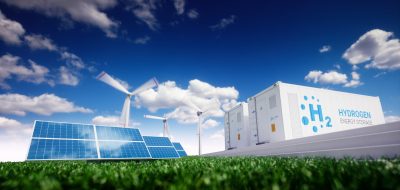Five research projects into electrochemical conversion materials (ECCM) can now start, with a top-up grant for Responsible Innovation. One requirement for this grant is close involvement from the humanities and social sciences in the research into ECCM innovations. A total of €1,922,477 has been awarded to the programme.

Research programme ECCM MVI top-up
The research into ECCM makes it possible to store energy from electricity in chemical compounds that can be used as a raw material or fuel (such as hydrogen). These developments therefore provide a solution for new innovations that society is asking for. The five MVI top-up projects are connected with the research of the tenure-track researchers from the NWO ECCM programme. The top-up research focuses on the societal aspects of ECCM. For example, it will be investigated how public values can be taken into account during the development of nanomembranes (NAMEs) so that the innovation can be realised responsibly. Another example is analysing the sustainability of large-scale electrochemical conversion of CO2, for which government and administrative interventions are proposed to make the commercial application of this technology possible.
About Responsible Innovation
Responsible Innovation (Dutch acronym: MVI) is the approach NWO has developed for research into the ethical and societal aspects of (technological) innovations (such as legal, sociological, economic and psychological aspects). The aim of NWO MVI research is to realise innovations that are socially acceptable.
About electrochemical conversion and materials
In the ECCM Tenure Track programme, six tenure track appointments have been awarded funding. The programme is aimed at the electrochemical conversion of materials. This key technology makes it possible to store energy from electricity in chemical compounds, such as hydrogen. These chemical compounds can serve as fuel or as raw materials for the chemical industry without the need for fossil sources. This is vitally important for the Dutch government’s objective of CO2 neutrality by 2050.
Awarded projects
Catalysing knowledge ecosystems for societal transitions
Advancing knowledge ecosystems for electrochemical conversion
The internet, MRI scanners, the first TV’s: society benefits strongly from innovations resulting from fundamental research. However, the road from asking the big questions to practical solutions and societal value is far from obvious. Here, we investigate how one can mobilise fundamental research into electrochemistry to help society.
Main Applicant:
Dr Rik Mom (Leiden University)
Co-applicants:
Prof. Eefje Cuppen (Leiden University)
Dr Laurens Hessels (Royal Netherlands Academy of Arts and Sciences)
Responsible Innovation Path for Ultrathin Nanomembranes for Electrochemical Conversion and Artificial Photosynthesis
Value Co-Creation in a Quadruple Helix System
In this project we ensure that ultrathin nanomembranes that are to be used in the production of basic fuels and chemicals using renewable energy develop a responsible innovation path. By this we mean that the development of this technology absorbs the relevant societal values and avoids the relevant societal risks.
Main Applicant:
Dr G. Katsoukis (University of Twente)
Co-applicants:
Dr Cornelius Schubert (University of Twente)
Dr Vincent Blok (Wageningen University & Research)
Socio-technical pathways and material choices for a responsible electrification of the production of chemicals and fuels
This project studies possible pathways towards producing ‘green’ chemicals based on newly developed electrolysers, and the environmental and societal implications related to the choice of materials involved. It applies a long-term perspective by scrutinising present application scenarios, anticipating future pathways, and by learning from challenges in preceding innovation trajectories.
Main Applicant:
Dr Marco Altomare (University of Twente)
Co-applicants:
Dr Andreas Weber (University of Twente)
Dr Laura Franco-Garcia (University of Twente)
Dr Kornelia Konrad (University of Twente)
Carbon capture and utilisation – historical context, technological challenges and societal acceptability
Tackling CO2 emissions requires new technological solutions, but technology alone is not enough. The energy transition requires with active public participation and confidence. This project is about understanding the historical, political, and social factors that shape the public’s perception of new energy technologies.
Main Applicant:
Dr Amanda Garcia (University of Amsterdam)
Co-applicants:
Prof. Gadi Rothenberg (University of Amsterdam)
Prof. John Grin (University of Amsterdam)
Sustainable design of multi-scale CO2 electrochemical conversion
The storage of renewable electricity in chemical bonds is a compelling technological option to synthesise fuels and chemicals that use CO2 as raw material. The current project analyses the sustainability of large-scale CO2 electrochemical conversion and proposes government and market-based governance interventions to allow its commercial implementation.
Main Applicant:
Dr Maria Pérez-Fortes (TU Delft)
Co-applicants:
Dr Tarkan Tan (Eindhoven University of Technology)
Prof. Ibo van de Poel (TU Delft)
Prof. Hans de Bruijn (TU Delft)
Prof. Floor Alkemade (Eindhoven University of Technology)
For the original news item see the NWO page.